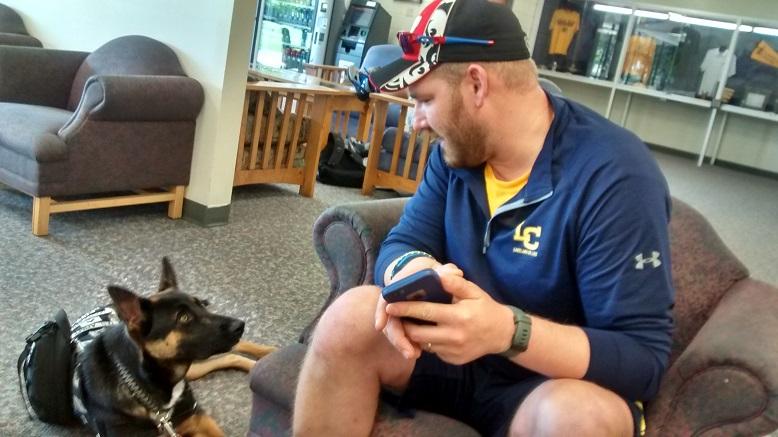Duke the service dog assists freshman Army veteran
September 27, 2015
You’ve seen Duke, a handsome nine-month-old German Shepherd pup, accompanied by his friend, Nicolaus “Nick” Marzahl, in classes and around campus. Perhaps Duke was catching balls as Marzahl threw them. But, you might be wondering, “What is Duke doing at school?”
Marzahl is a freshman student at Lakeland, majoring in nursing and psychology. He is 33 years old and has been married to his wife, Amber, for 10 years. Having served for 13 and a half years in the Army, he is a veteran of the Iraq War where he served two one-year tours of duty (2006 and 2009). Due to his service in the infantry during the war, he developed Post-traumatic Stress Disorder.
Post-traumatic Stress Disorder (PTSD) is, according to the Mayo Clinic website, a condition caused by exposure to terrifying events, such as war. “Symptoms may include flashbacks, nightmares, or severe anxiety, as well as uncontrollable thoughts about the event.” PTSD can be debilitating, causing seemingly irrational reactions to common noises and experiences. Marzahl’s PTSD was so severe that he was unable to leave his home due to the levels of stress and anxiety he experienced outside of his home.
Duke changed that.
“Duke saved my life,” said Marzahl.
Although Duke is still a puppy, he is a service dog. He lives with Marzahl and accompanies him to classes, shopping and any other places Marzahl wants to go.
“Now I can go places,” Marzahl said. “My anxiety is greatly lowered; it’s at a manageable level, I guess.”
Duke helps by “paying attention” to things happening around Marzahl, meaning that his owner doesn’t feel the pressure to be on heightened alert himself. Duke helps in crowded situations, setting boundaries with people who might come uncomfortably close to Marzahl.
Before and after classes, when there is a river of students flowing between buildings, Duke will place himself between Marzahl and the bulk of the crowd, serving as a canine buffer. In the classroom, Duke might put his paw on Marzahl’s leg or climb on his lap as he acts in his role to alert, comfort and protect.
As a young service dog, Duke is still in training. He and Marzahl attend weekly training sessions and practice almost constantly. When Duke is wearing his service vest, he is working, even if it appears he is at rest or playing.
During the Mirror interview, Duke was chewing a toy bone, but was still alert to his surroundings and any possible threats. If there was a sudden noise, or another student came close to Marzahl’s chair, Duke immediately brought his eyes and ears to attention, ready to alert Marzahl of any possible threat.
Marzahl explained that while Duke also serves as a therapy dog in some ways, his training is more expansive as a service dog. Also, while therapy dogs are limited to working in settings such as hospitals and nursing homes, Duke’s role as a service dog allows him to accompany Marzahl anywhere.
Although very intelligent and well-trained, Duke is still a puppy. Play is one way in which he processes the things he has been learning. When he is able to run, or fetch a ball, his brain is working on internalizing the lessons he and Marzahl have been working on.
Marzahl would like students to keep a few key guidelines in mind when it comes to interacting with Duke:
- If Duke has his service vest on, he is working.
- Because Duke is a puppy, he will still occasionally do “puppy” things.
- Marzahl does clean up after Duke completes his “business.” The grass is safe for all.
- If you want to pet Duke or give him treats, please ask. As with all service dogs, it is best to ask when Duke is at play, or not wearing his vest.
- Duke’s diet is specific, so he receives absolutely no people food. As Marzahl said, “Don’t even ask.” If Marzahl has given the okay for treats, he will also provide the treat for Duke.
Marzahl appreciates the response from students, faculty and staff at Lakeland. He chose Lakeland because of the nursing program, but has enjoyed the small class sizes and warm reception he and Duke have received here. Having and training a service dog is challenging work. Yet for someone like Marzahl, the benefits of mobility and emotional and physical support far outweigh those challenges.
For more information on interacting with a service dog, see: http://www.anythingpawsable.com/10-things-service-dog-handlers-want-know/#.VgWxESBViko


